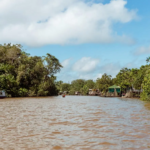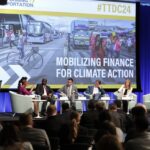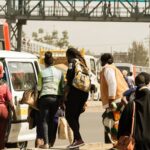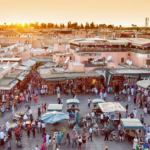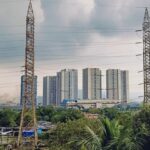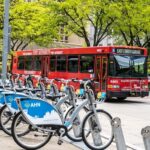Posts tagged with 'policy'
The transformation of Buenos Aires’ Rodrigo Bueno neighborhood over the last decade is remarkable. What was once an informal settlement lacking sewers and clean water is now a thriving, diverse community where residents own their homes. A new street system and electrical ...

In 2019, Stellantis (then known as Fiat Chrysler) announced a $2.5 billion plan to expand and modernize two of its auto assembly plants in Detroit. This triggered the city’s Community Benefits Ordinance (CBO) — a unique law that requires companies ...

In Mathare – a collection of informal settlements northeast of Nairobi, Kenya, housing more than 500,000 residents – heat is reshaping daily existence. Most buildings in Mathare are constructed from materials like corrugated metal, which trap and magnify heat, forcing ...

Departing from the Amazonian city of Belém, Brazil, in a speedboat, it takes around 10 minutes to reach the shores of Combu Island. As the skyline fades into the distance, the lush, green environment of the island comes into view ...

Getting more zero-emission trucks on the road is an important transportation shift that is needed to reduce air pollution, protect public health and curb climate-harming emissions. But transforming the entire trucking industry is a challenging feat that will require the ...

At the 43rd session of the Intergovernmental Panel on Climate Change (IPCC) in Nairobi, Kenya, in 2016, the Panel decided to include a Special Report on Climate Change and Cities in the IPCC’s seventh assessment cycle. This achievement marked a ...

If a picture can tell a whole story, then the image below of an intersection in Dar es Salaam, Tanzania, shows the past, present and future of global transformation in the transport sector. During Transforming Transportation 2024, which focused on ...

For a woman living in an African city, public transport can be a daunting experience. Women usually plan their trips in advance, and consider a multitude of factors before setting out: What is the safest way to reach the bus ...

The past year registered record-shattering global temperatures. People around the world are already witnessing epic heat waves, wildfires and drought at 1.1 degrees C (2 degrees F) of global warming, compared to pre-industrial averages. With current policies putting the world on ...

As dense hubs of diverse talent, skills and innovation, cities are perfect places for public-private collaboration. In light of urgent calls from the international community for solutions, the wealth of creativity and expertise on urban sustainability in Global South cities can ...

City officials tasked with reducing and eliminating greenhouse gas emissions from their communities face a tricky task in estimating building emissions as they work to prevent the most harmful impacts of climate change. The biggest challenge is that there isn’t consensus ...

To cut transport emissions, moving vehicles away from burning fossil fuels is a fundamental step. However, the e-mobility transition is not only an opportunity to reduce emissions but to modernize mobility across the board, from expanding access to public transport ...

More than 20 million students in the United States ride school buses every year. This equals approximately 7 billion trips per year, making school buses one of the most widely used forms of public transport in the United States. But those trips aren’t always ...

As our colleagues have covered previously, there are clear health and environmental benefits to adopting electric school buses instead of their diesel counterparts, which account for more than 90% of the U.S. school bus fleet and result in harmful exhaust ...

U.S. President Biden has touted the potential climate benefits of the Bipartisan Infrastructure Law, which makes historic investments in transportation, the country’s largest and fastest-growing source of greenhouse gas emissions. But while the bill’s investments could significantly lower transportation emissions, those reductions are not ...













